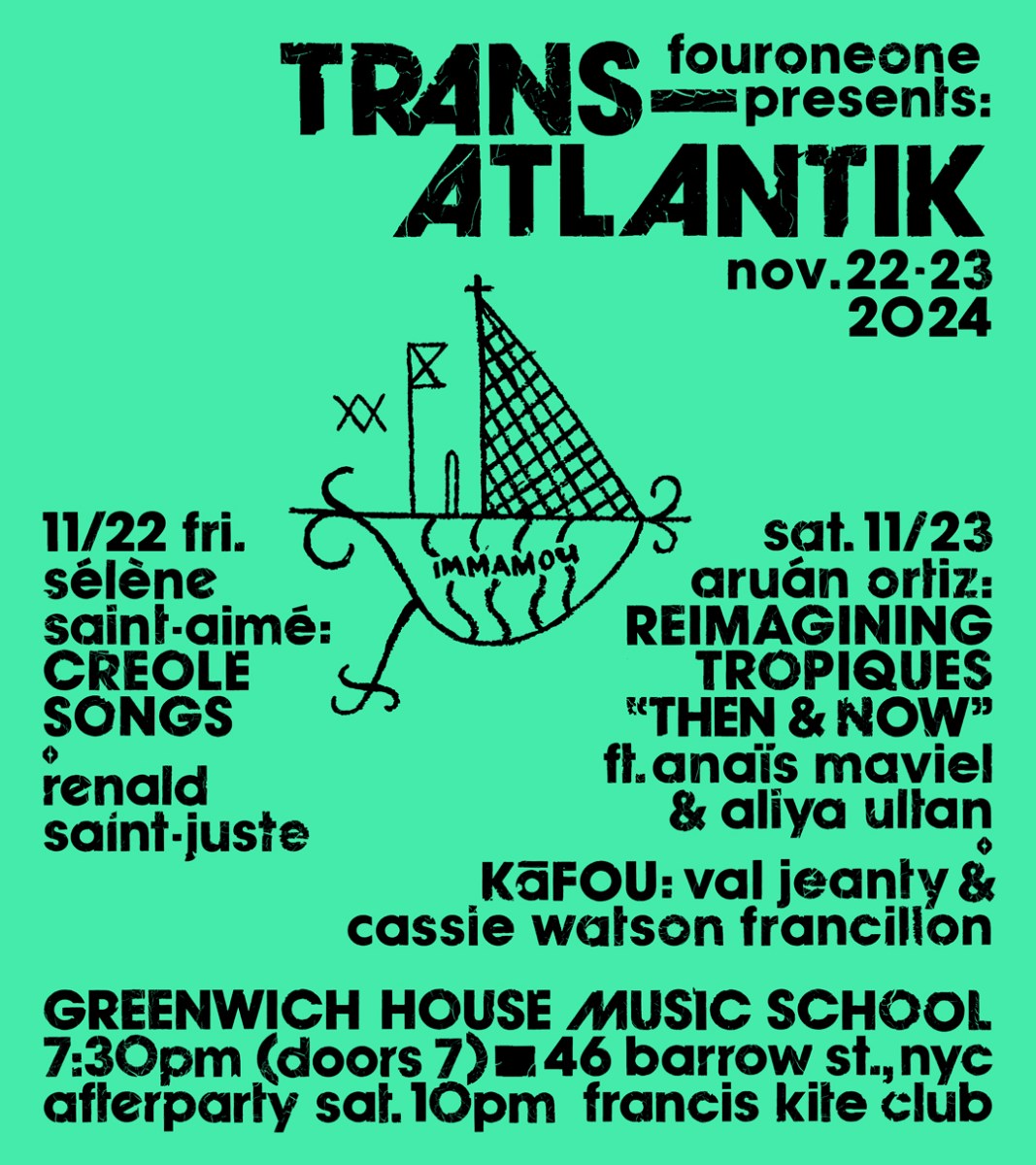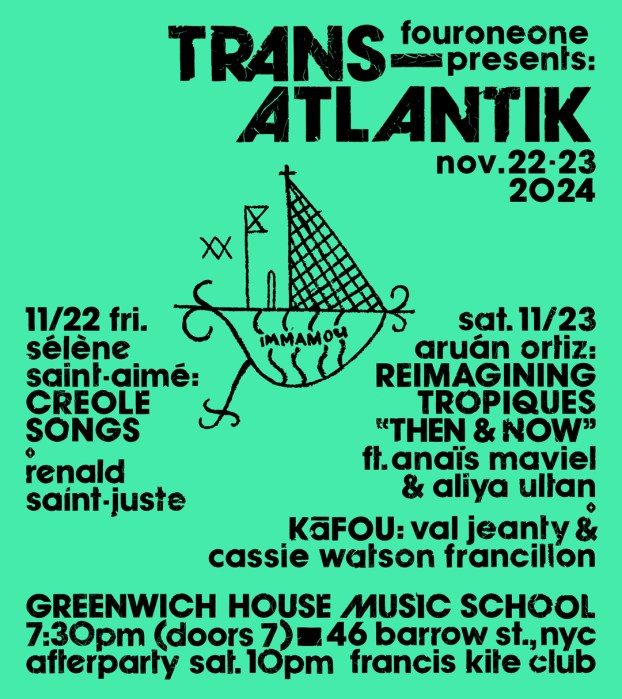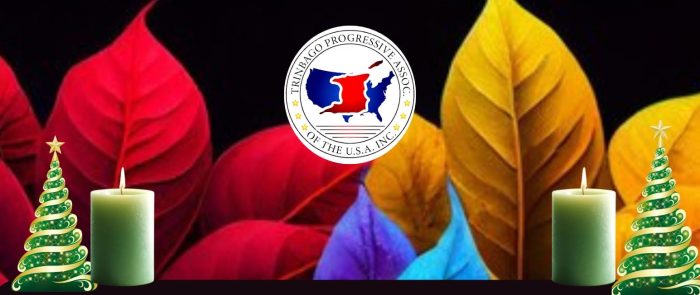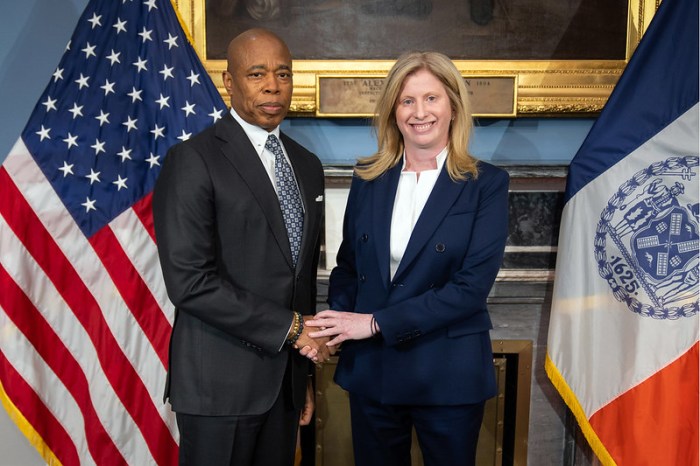
Transatlantik: Reimagining Tropiques: Then and Now (Aruán Ortiz ft. Anaïs Maviel, Aliya Ultan), KāFOU (Val Jeanty, Cassie Watson Francillon)

Reimagining Tropiques: Then and Now is a collaboration between Aruán Ortiz and Anaïs Maviel, with cellist and composer Aliya Ultan. The project considers writings on negritude, creolization, and transatlantic Surrealism published by the iconic Martinican magazine Tropiques (1941–1945), and explores the cultural syncretism between French modernism and the Afro-Caribbean experience. Focusing on the work of Suzanne and Aimé Césaire and their wider community of writers and intellectuals, the score integrates Afro-Caribbean rhythms and chants, contemporary classical music, jazz improvisation, poetry, and spoken word.
Born in Santiago de Cuba, composer, pianist, music researcher and conceptualist Aruán Ortiz has been an active figure in the progressive jazz and avant-garde scene for more than 20 years. In collaborations with jazz ensembles, orchestras, chamber groups, dancers, and filmmakers, Aruán has explored numerous means of expressing Afro-Caribbean traditions through other genres and musical forms, including jazz, serial music, and contemporary classical. He is a Guggenheim Fellow in Music Composition 2024 and a Doris Duke Impact Award 2014. Ortiz has released more than 15 albums as a leader, and has collaborated on more than 30 recordings. As a music researcher and conceptualist, his works express a reverence for the rich diversity present in the music, history, politics, literature, visual arts, oral cultural expressions and traditions of the Afro-descendent communities in the Americas.
A vocalist, percussionist, composer, music director, educator, curator and healer, Anaïs Maviel’s work focuses on the function of music as essential to settling common grounds, addressing Relation, and creating a utopian future. Inspired by Edouard Glissant’s reflections on Creolization, she has associated her work with the inextricable currents that move spaces and people between times and lands. The contemporary context of re-formulation of self, reality and social structures led her to question the use of language, and to explore its vibratory essence in music. As a leader she is dedicated to substantial creations from solo to music direction for large ensembles, and to expanding the power of music as a healing & transformative act. Her path has led her to share her music extensively in New York, as well as in multiple places throughout North, Central & South America, Europe and Haiti. Her solo debut hOULe (Gold Bolus Recordings), received international acclaim.
Aliya Ultan is a composer and cellist from Brooklyn, NY. As a teenager Aliya participated in the New York Philharmonic’s Very Young Composer’s Program where her music was both workshopped and performed at Lincoln Center. In 2011 she was accepted to the Interlochen Arts Academy on a full scholarship where she studied composition with Dr. Cynthia Van Maanen and cello with Crispin Campbell. She has collaborated with musicians based in folk, punk, jazz and classical musics as well as creative writers with an interest in abstract storytelling. She is a Jack Kent Cooke Young Artists Awardee (2015) and currently serves as a Program director for Make Music Cleveland and CREDO Music.
KāFOU, meaning “Crossroads” in Haitian Kreyol, is a nouveau kreyol ambient collaboration between Val Jeanty and Cassie Waston Francillon. Combining percussion, concert harp, and electronics, Val and Cassie “merge Haitian spiritual traditions, Black American roots, and experimental soundscapes to craft a powerful dialogue on lineage, connection, and innovation.”
Val Jeanty, also known as Val-Inc, is a Haitian-born electronic music composer, soundchemist, turntablist, and professor at Berklee College of Music. She is a pioneer of VodouElectro, also referred to as Afro Electronica, which blends traditional Haitian Vodou rhythms with modern electronic soundscapes. Jeanty’s work explores the intersection of African diasporic culture, spirituality, and technology, positioning her as a leading figure in Afrofuturism. Her installations have been showcased in New York City at the Whitney Museum, the Museum of Modern Art, the Brooklyn Academy of Music and internationally.
Cassie Watson Francillon is known on the New Orleans scene as a visionary harpist and interdisciplinary artist who constructs a “sacred sonic architecture” through modern music on her concert grand harp. Influenced by hip-hop, jazz, psychedelia, and Black American spirituals, her sound reflects the journey, joy and lamentations of modern Black American transcendence, coupled with spiritually sonic investigations of her father’s Haitian lineage.
Reimagining Tropiques: Then and Now has been made possible through Jazz & New Music, a program of Villa Albertine and FACE Foundation, with support from the French Ministry of Culture, Institut français, SACEM (Société des auteurs, compositeurs et éditeurs de musique) and the CNM (Centre National de la Musique).
About Transatlantik:
This November, FourOneOne presents Transatlantik, two days of performances and conversation with diasporic artists engaged with the artistic and political concepts of negritude and créolité: Aruán Ortiz’s Reimagining Tropiques: Then and Now ft. Anaïs Maviel and Aliya Ultan; Sélène Saint Aimé’s Creole Songs; KāFOU (Val Jeanty and Cassie Watson Francillon); Renald St. Juste; and Patrick Chamoiseau, the Martinican author and theorist of créolité; plus an afterparty with Alexis Marcelo, DJ Buddy and DJ Jeff Brown. Transatlantik kicks off FourOneOne’s series of performances, discussions, and other public convenings exploring creolization, the fraught process of social, cultural, and linguistic mixing through the enforced cohabitation of racialized and subjugated peoples within the extractive contexts of slavery, colonialism and plantation societies.











